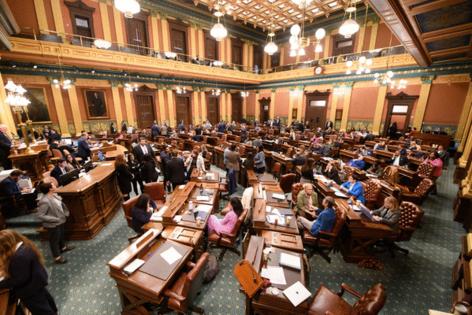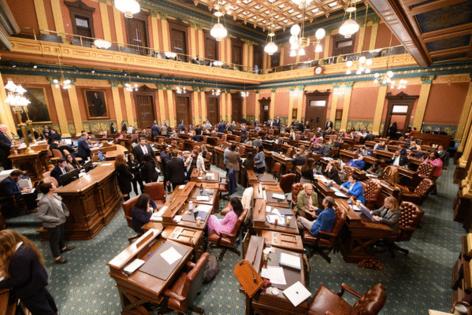Michigan House OKs economic development trio on R&D, startup grants, data center tax breaks
Published in News & Features
LANSING, Mich. — Michigan House lawmakers moved a series of economic development bills off the chamber floor Wednesday and on to the Senate, pushing forward a suite of legislation that would implement tax credits, tax exemptions and grants for businesses.
The bills would create a research and development tax credit, an innovation fund to benefit startups, and exempt data centers from sales and use taxes.
The research and development bills passed with bipartisan support, 86-23; the data center bills passed 64-45, despite environmental advocates' opposition; and the innovation fund bills also was approved with bipartisan support, with the main bill passing 74-35.
"Here in Michigan, we know we have the best entrepreneurs, we know have the grit, the determination and hustle to compete with anyone in the world," Rep. Alabas Farhat, D-Dearborn, said of the startup package's passage. "And today's innovation fund is a clear symbol that we're going to invest in our entrepreneurs and we're going to invest in our state's innovators."
But not all of the legislation received a warm reception among stakeholders.
The Michigan League of Conservation Voters expressed concerns that the Democratic-led House had missed opportunities in the data center legislation to limit water usage, guarantee environmental protections and keep residential energy costs low.
“Economic development and what makes Michigan great — our water, land and clean air — should go hand-in-hand, but the legislation voted out today falls far short of ensuring our rates won’t go up and we won’t see the rush to build additional fossil fuel plants to power these data centers," said Bob Allison, deputy director for the league.
R&D tax credit
The research and development bill would create a state-level credit that would be administered through the Department of Treasury.
Research and development tax credits are already available at the federal level, but about 37 states also offer a state-specific research and development credit. The qualifying criteria associated with Michigan's proposed credit largely mirrors the federal criteria.
“We are making it known that our state is full of opportunities to start and develop a business, which will ultimately create jobs and boost our economy," said Rep. Jasper Martus, the Flushing Democrat who helped introduce the bills.
Eligibility for the tax credit largely would hinge on a company's expansion of research and development spending within Michigan and the effort's potential for job creation, economic impact and technological advancements.
The bill, which would apply to existing and new research and development efforts, has an overall cap of $100 million per year, with at least $25 million going toward businesses with fewer than 250 employees.
Innovation fund
The innovation fund would invest in high-growth startups through a program that would award grants to certain venture capital funds and nonprofits promoting venture capital investment.
The Legislature appropriated about $60 million into the Michigan Innovation Fund in the state's annual budget passed in June.
The program, operated by the Michigan Strategic Fund, would provide grant support for emerging evergreen funds, venture funds, venture capital funds and start-up support services.
Recipients of the grants would have to submit an annual report on their activities, including what was spent on administrative costs and what investments were made with the money.
"We put certain conditions to make sure that the state is getting the return on its investment that we want," Farhat said. "We have strong reporting guidelines that we worked together on bipartisanly. We have carve-outs to make sure that a percentage of funds goes to our geographically disadvantaged entrepreneurs."
Data centers
The data center bill passed Wednesday completes a two-bill package that will exempt data center projects from sales and use tax in an effort to lure the developments to Michigan. The first of the two bills passed in September, but Democrats were unable to garner support at that time for the second bill.
Data centers hold interconnected networks of computers that store and manage data for internet and other services, and companies are building more of them to meet growing demand for computer and data services. The centers do not create a large number of jobs, but bring in significant property tax revenue for local communities.
In moving the legislation through the House, Democrats made several changes to the legislation to address environmental concerns over data centers, including a sunset on the tax break, requirements that the centers use municipal water supplies and guarantees that the higher water and electricity usage won't drive higher costs for other ratepayers.
"This is the most environmentally protective data center legislation in the country at this point," said Rep. Joey Andrews, a St. Joseph Democrat who sponsored the bill passed Wednesday. "... This is a model now for other states to copy as they do data centers to protect people.
"I really think a lot of this just got wrapped up in ego on their side of things," he added of environmental opposition to the bills. "This started being about killing something to prove they could instead of being about compromising and finding good middle ground."
Christy McGillivray, legislative and political director for Sierra Club Michigan Chapter, said it was a “disgrace” that a majority of Michigan legislative Democrats would approve tax breaks for the major corporations seeking to build data centers in the state.
The facilities are heavy users of water and electricity. The increased demand will lead utilities to build new polluting power plants on ratepayers’ dime, she predicted.
“It is unequivocal and irrefutable that the data center bailout to power artificial intelligence is being paid for by regular ratepayers,” McGillivray said. “The amount of energy required by these facilities and the water and electricity required to run these things is a massive investment.”
_____
(Staff Writer Carol Thompson contributed.)
_____
©2024 The Detroit News. Visit detroitnews.com. Distributed by Tribune Content Agency, LLC.










Comments